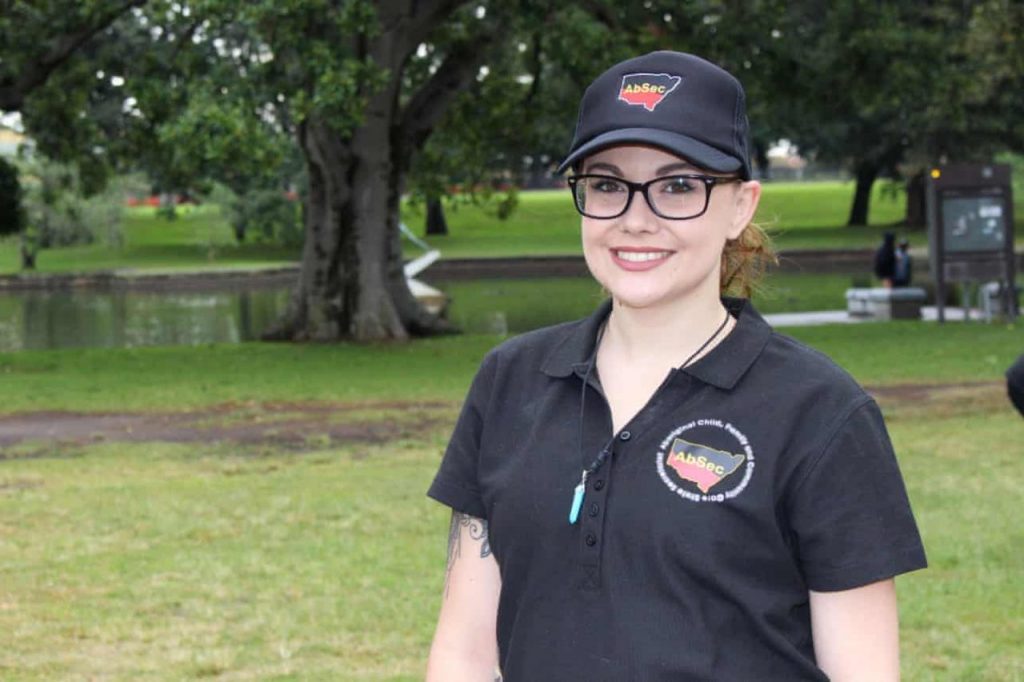- Leticia Anne Designs
From The Guardian

Leticia Quince arrived at her foster home unable to communicate except by notes. She now helps young Indigenous foster care leavers.
When Leticia Quince was taken into foster care at the age of 12, she was so traumatised by her prior experiences that she would only talk with her carer by sending notes under the bedroom door.
“I was so shut down and so scared to express my emotions that I wouldn’t even talk to my carer, so I would write things on paper. I’d actually write letters to let her know how I was, and I would pop them under the door, and she’d write back to me, and then that’s how I would communicate,” Leticia said.
It took a long time – years of counselling – for Leticia to learn how to manage the PTSD she experienced as a child.
“Having my counsellors taught me strategies in how to be confident in myself, helped me build that trust to stay close with my carer. I was able to then build a relationship to the point where I was able to tell her absolutely anything and everything, so that she doesn’t see me any different.”
In 2009, Leticia was the eldest of six children all taken into care at once. It was terrifying.
“When we went into care and got split up. That was quite traumatic, and I guess when you are removed and told you’re going to a foster carer, you’re going to a stranger’s house, you don’t know where you are, and you have no sense of safety, security or belonging whatsoever.”
“The experience at the start definitely wasn’t a positive experience. It was terrifying especially because of our age. We were told it was just for the weekend, so that’s something that I remember because I guess they [the Department of Family and Community Services] don’t want to scare the child or make them feel uncomfortable.”
“So then it went from a weekend to a week, and then a couple of weeks, and then a couple of months and it was still going through court.”
“Myself and my little brother went into one care placement, my two youngest sisters went to another care placement, and then the other two went to another placement in a different town, so we ranged from an hour and a half to three hours away from each other.”
Eventually two of her siblings came to live with her foster family too.
“So four of us got to be together, and two still lived an hour and half away. They never encouraged that relationship, and eventually I felt intimidated, and I suppose I got so used to being in care that I stopped going and seeing them, so our contact just ended. But we have reconnected now that we are all over 18.”
Turning 18 is a big milestone for kids in out-of-home care. It’s when they are no longer the responsibility of the state child protection system. But that’s not necessarily something to celebrate.
Studies show that young people leaving care are more vulnerable than others their age: they’re more likely to be homeless, become young parents and be involved in the criminal justice system, and are less likely to be employed.
“I have no regrets in the placement I was put into, I was actually lucky. I was very loved, supported and I have gained a new family. But I am very much aware that doesn’t happen for everyone,” Leticia said.
Leticia says growing up in a stable loving home, with access to trauma counselling helped build her life in a positive way. But she hasn’t seen her parents in years. She stopped going to contact visits when she was 14.
“I haven’t seen my mum, or both my parents in a long time, dad since I was 14 and my mum since I was 16. I have spoken to them on the phone, probably two years ago. I guess at the time it was the impact it had on me when I returned to my care placement, whether I had memories triggered or questions unanswered.”
“I was able to identify as I grew older that the abuse that I went through was something that I didn’t want to have in my life. And at the time I was experiencing some pretty bad post traumatic stress disorder.”
She’s not angry or sad about what might have been.
“There are some unresolved issues that I have but because I have my new family supporting me constantly it’s not something that I think about. Because I am also a case worker, working in the care sector, I’m very much aware of where my parents sit and what could have led to their situations and their parenting decisions. So I can see it from an outside view of what’s going on, but at the end of the day my personality trumps my “work eyes” and I just I keep my world safe.”
But Leticia wishes she’d had a chance to know her extended Wiradjuri family, growing up. Like many kids in out-of-home care, she only started making those connections after she turned 18.
“Facs don’t look at extended family. In my case they didn’t look at extended family as someone who could be support or carers for me. They could have done more family-finding. Especially with Aboriginal culture, it’s really important to keep those connections.”
“I recently made some family connections. Last week I contacted my great aunt and spoke to her on the phone, and I’ve spoken to a couple of people and they are now positive people in my life.”
“It does get to be overwhelming at times reconnecting with family, but it also makes you realise they haven’t forgotten about you.”
At 21, Leticia is the kind of young achiever parents love to brag about. She was awarded multiple scholarships at high school. After finishing the HSC, she completed a diploma of community services, a diploma of Aboriginal studies, and she taught contemporary and hip-hop dance at the local community centre. She’s currently studying to be a personal trainer as a side gig to her job as a caseworker.
For the past 17 months, she’s been working with young Aboriginal people aged between 16 and 23 who have recently left the foster care system and have become homeless.
“I do have a passion for working with out-of-home-care young people, and that’s because I know how messed up the system can be. I also want to be a support for them in ways they sometimes miss out on.”
“The ultimate thing that I want to achieve eventually is a program around transitioning young people into independent living. You should have someone come and teach you how to cook, how to clean, how to set up electricity, how to shop and budget, understand healthy living.”
“The fact is that a lot of them are now accessing homelessness services. What is that showing to me? It’s showing that the support they’ve had during their time in care hasn’t been adequate. They shouldn’t be in the space where they have nowhere to live or no support.”
“And then the cycles continue. We definitely need more support for transitioning young people into independent living, and linking up to their cultural connections.”
“I have built my life in a positive way, but if I was to think back on my time in care, what hit me at 18 was the fact that I couldn’t sit just down and talk to my family.”
“I had cultural needs and wanted to know if I was belonging somewhere and it wasn’t until after I turned 18 that I did all my family tree.”


